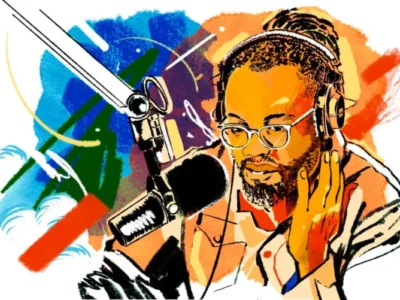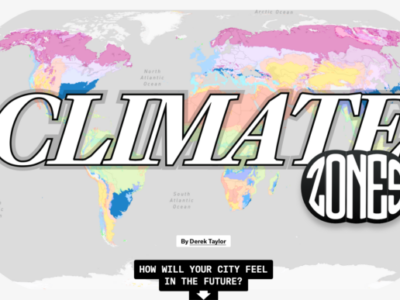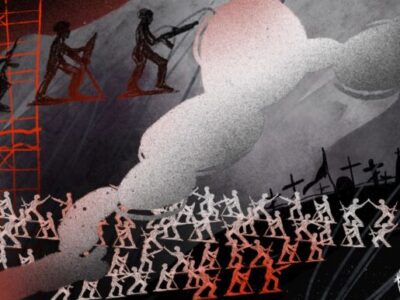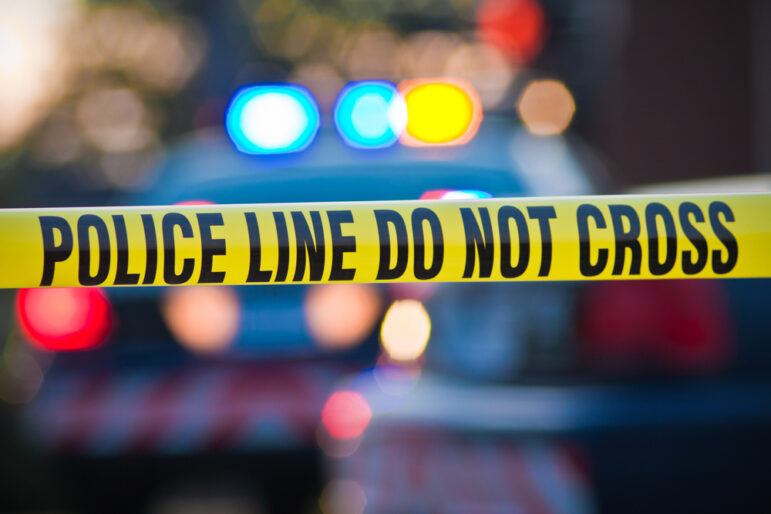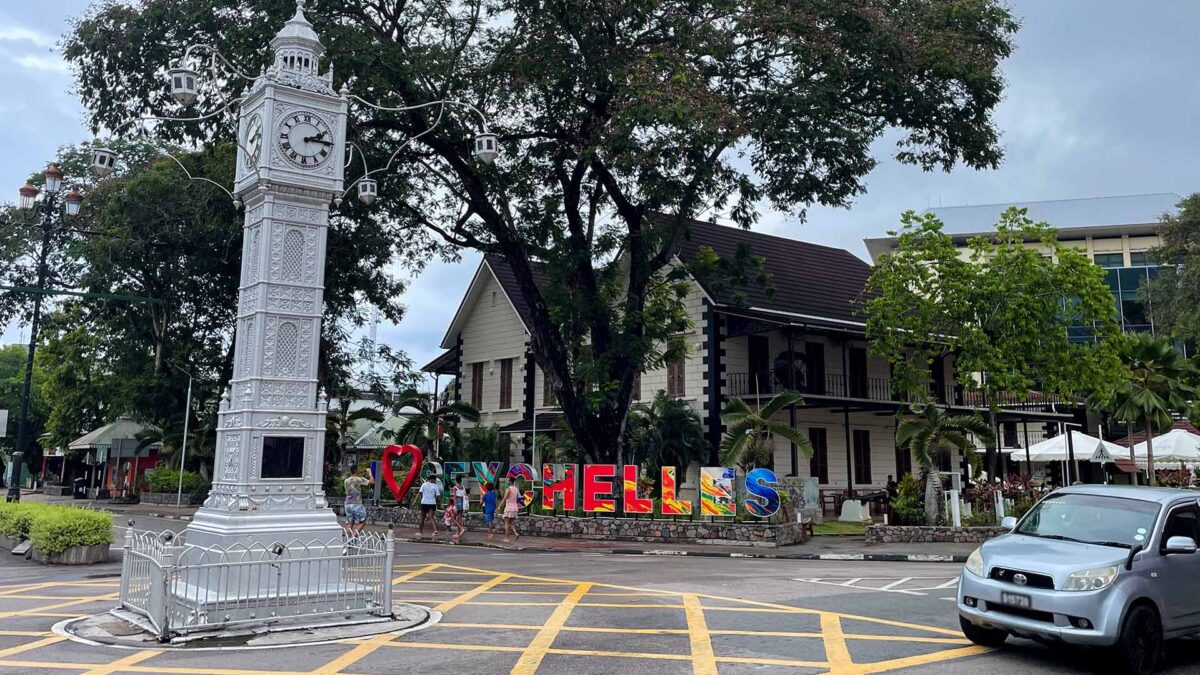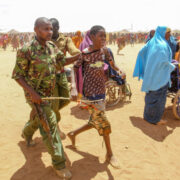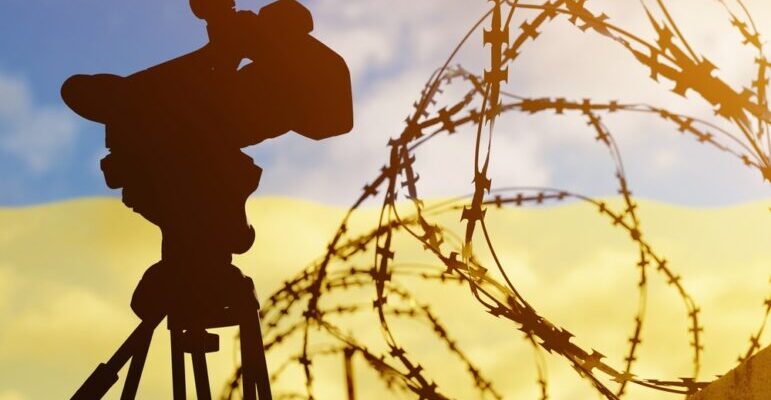
For years, the journalists of Ukrainska Pravda focused their work on politics and corruption, investigating the yachts and planes of the country’s oligarchs. But as Russian troops surged over the border in 2022, news from the frontline and about the war soon came to make up 90% of their work.
Investigative reporters pivoted to report on human rights abuses. Staff had to relocate, from their towns and cities, and even for a while, from Kyiv.
“When the rumors started to spread I understood that we needed to have a plan,” says Sevgil Musaieva, the editor-in-chief, speaking about the weeks that led up to the invasion. “It was difficult because no one believed that war was coming.”
But as a former business reporter from Crimea – which Russia annexed in 2014 – Musaieva feared that a larger scale war with Moscow was never far away. Ukrainska Pravda — which means “Ukrainian Truth” — needed a security plan.
The first day of war, February 24, 2022 was a “long day,” she recalled, speaking at a panel about reporting during conflict at the 2024 Trust Conference in London. Many of her journalists needed persuading to leave, even to go to the west of Ukraine as a safety measure and to ensure that, as a publication, they could keep operating.
Two-and-a-half years later, most staff are back in Kyiv. “Because we have to be with our people. For journalists, the way we work, we have to work for our audience. If they stay we also have to stay,” says Musaieva, who has been editor-in-chief for 10 years and was named one of the 100 most influential people in 2022 by Time Magazine.
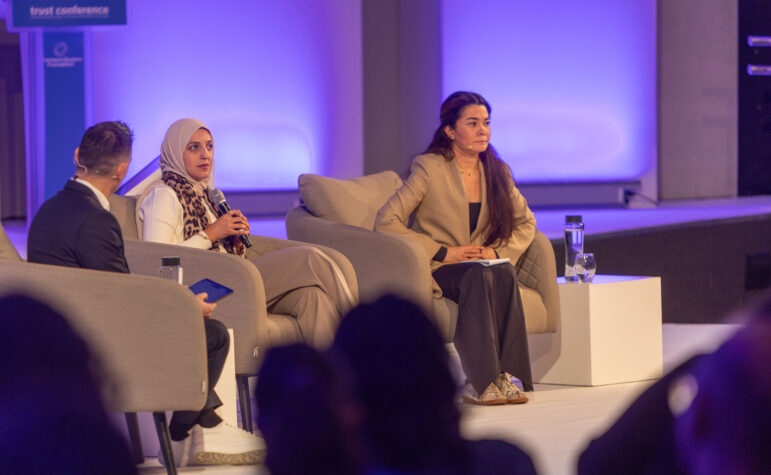
Ukrainska Pravda Editor-in-Chief Sevgil Musaieva (right) on a panel at Trust Conference 2024, the Thomson Reuters Foundation’s annual flagship forum. Image: Courtesy of Thomson Reuters Foundation
But the war has taken its toll. The father of one member of the team was killed in Bucha. To date, a dozen staff members have left to go and join the war effort, including one, the former environmental and agricultural correspondent, who decided recently that “reporting was not enough.”
“Eleven colleagues have gone to fight,” said Sevgil. “The 12th, Dana, is 23 years old, brilliant in the environmental and agricultural sphere.”
As an editor, she says hearing about decisions to enlist in the fight brings mixed feelings. “First of all, I’m thinking she is 23 years old. She’s just a girl. Secondly, I’m thinking we will lose our person covering agriculture, and you spend years and years to train and educate a journalist.”
But overall, she says she has to accept the decisions people in her team make, and says she holds great respect for anyone making this choice. “I have to just accept it,” she explains. “I have this moral dilemma — even in me — this is an existential war for Ukraine and everyone asks themselves: What is my role? Is it enough?”
There have been terrible losses, too. In October, the Russian government announced that freelance Ukrainian investigative reporter Victoria Roshchyna, who reported for Ukrainska Pravda, had died in custody the month before. She was only 27.
Roshchyna had made a name for herself traveling to the Ukrainian occupied territories — places where few other reporters dared to travel, according to Musaieva. “It’s dangerous and nobody has access.”
“The death of Victoria Roshchyna is a big loss for the Ukrainian media landscape. I have no words for it,” Musaieva says. “She was always on a mission. Victoria was the only one covering a lot of important issues of people in Berdyansk, Mariupol. It’s a tragedy for the journalists in Ukraine.”
Roshchyna had reported on everything from private military units to the camps where Ukrainian children were forcibly moved to by Russia. She interviewed the staff of a nuclear plant seized by Russian forces near the start of the war. Before her last trip, she had asked Musaieva if she would be interested in stories about life in part of eastern Ukraine occupied by Russian troops, people being tried by the authorities allied to Moscow, the stories of those who had been captured.
“I think she mostly wanted to focus on Russia’s human rights violations in the occupied territories, camps, jails, and how Ukrainians were living in these conditions,” Musaieva tells GIJN. “She put her life at risk. It’s difficult to speak about her in the past.”
Roshchyna disappeared on August 3, 2023, according to Reporters Without Borders, and died while detained in Russia on September 19, 2024, according to a letter from the Russian Defence Ministry received by her family.
“The Russian authorities have never provided any information about her detention, despite repeated requests from her family, the Ukrainian authorities, and RSF,” Jeanne Cavelier, head of RSF’s Eastern Europe and Central Asia desk, said in a statement when Roshchyna’s death was announced last month. “They must shed light on all the circumstances surrounding her detention and death.”
Beforehand, Ukrainska Pravda had heard rumors that Roshchyna was on the list of people who could be returned in a prisoner swap.
“I dreamed about her being released. On September 13, I had some sources involved in the negotiation process, they promised me she would be released on that day. Then it did not happen, Musaieva tells GIJN. “We understand something may have happened. In one month her father received this letter, this is heartbreaking. She was almost released from the prison and she died.”
All they know at this stage was that she had been on hunger strike — they believe she had only one call with her father in the year she was imprisoned, and he asked her to start eating again.
“We are still in our investigation, we are trying to find out what happened but it’s hard, we don’t have access to the territories, we don’t have her body back. Russia avoids that,” Musaieva notes. “We had an opportunity to speak with a woman who was imprisoned with her. She said the conditions were terrible, they did not have enough food. Victoria did not have enough medical support.”
Musaieva says that, as an editor, she is always weighing the security risks of her staff and freelancers who, in her words, are “always a target of Russian military forces.” Before anyone is dispatched into the field, they speak to sources on the ground and the Ukrainian armed forces to check if it is safe, delaying trips where it is still dangerous.
“Security, it’s difficult,” Musaieva explains. “When my journalists travel to the frontline, of course I ask my sources and the Armed Forces of Ukraine — is it dangerous to be there now? If it is, I say you can go two, three days later because it’s still dangerous.”
Roshchyna had been detained before — she even spoke about it in a 2022 interview, in which she said: “We are losing our territories and I want to record these crimes… I also want to talk as clearly as possible about how the occupiers are using our territories, what it is becoming, and how important they are to them. This is history.”
As her editor, Musaieva said Roshchyna was passionate about making sure the people of eastern Ukraine were not forgotten, but also hard to hold back.
“We asked her not to put her life at risk,” Musaievea says. “She decided to go one more time to travel to the front. I asked her many times and she responded that she says that this is her calling. Because nobody covered, from Ukraine, the life of people in the occupied territories.”
The Ukrainska Pravda investigative team is still standing, but has been depleted. Their lone investigative reporter, Mykhailo Tkach, who joined the site in 2021, continues to report, supported by an editor and video reporters.
“He mostly focuses on anti-corruption issues,” Musaieva explains, adding his latest stories have explored weapons procurement and contracts. “I think that if you ask about Mykhailo, he is one of the most prominent investigative journalists in the country. He’s the only person in the department that’s an investigative journalist, he’s very productive.”
She would like to hire or train up more investigative reporters to focus on war crimes. And while recruitment is hard, she’s convinced of the power of the work they do to cover the conflict and investigate what is happening in Ukraine.
“It’s hard, I heard so many times from different people: You are our last chance to be heard, for our story to be listened to. That’s always important. When people get lost or disappear, journalists are the ones that investigate, that can help them be heard and understood,” Musaieva says. “It gives hope.”

